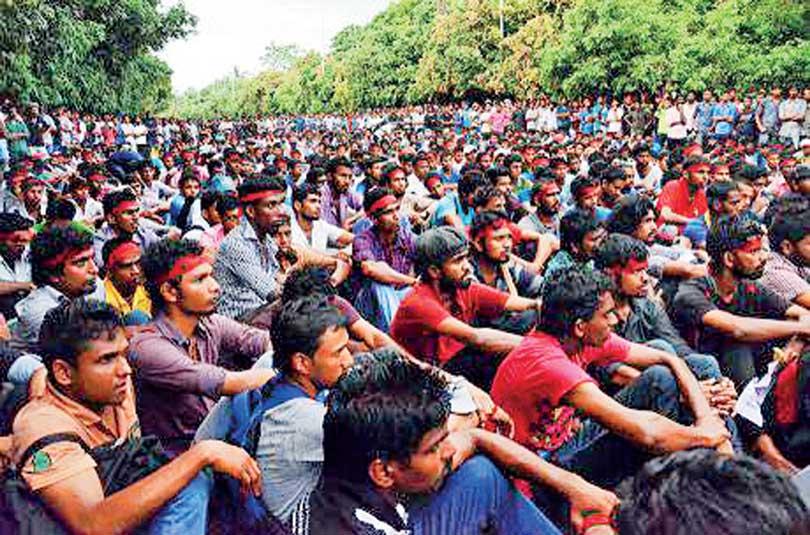05 Jul 2022 - {{hitsCtrl.values.hits}}
 University students in a protest
University students in a protest
 The present economic crisis has affected virtually every sector and education is no exception. Apart from schools, universities were closed for the most part due to the pandemic and now the economic and fuel crises have precipitated their closure again. In the face of the acute economic hardships and the soaring cost of living, some students have opted to drop out of university to help their parents and families cope with the harsh conditions. The Daily Mirror spoke to some students who had decided to drop out of university with a heavy heart and a load of worries in their minds to work towards the well-being of their families.
The present economic crisis has affected virtually every sector and education is no exception. Apart from schools, universities were closed for the most part due to the pandemic and now the economic and fuel crises have precipitated their closure again. In the face of the acute economic hardships and the soaring cost of living, some students have opted to drop out of university to help their parents and families cope with the harsh conditions. The Daily Mirror spoke to some students who had decided to drop out of university with a heavy heart and a load of worries in their minds to work towards the well-being of their families.
Plight of students
* Nishamani, a student of Rajarata university, who was in her third year, has dropped out as she has to provide for her family during these difficult times. “Our university did not encourage online exams; therefore, we did not have exams during COVID. As a result examinations lagged by six months in our academic calendar. I would have been in my fourth year if not for it. My mother is old and my father is paralysed. My father was a farmer, but due to his paralysis, he no longer does farming. I have a younger sister, and recently, she got selected to the Ruhuna University. While I was doing my studies, it was my sister who provided for the family. I could not be selfish and let my sister drop her education, so I decided to say goodbye to my education and provide for my family. If I had been in my last year, I could have completed my degree, but the six-month lag made the completion of university education unthinkable. We have a little plot of land. I cultivate on that. I want my sister to continue studies for her degree, and I will make sure that I provide for my family,” she said with determination.
Dhanushka Madawala, a dropout from the University of Sri Jayewardenepura, with a heavy heart, stated that both online learning and the economic crisis together put an end to his university education. “When I was about to enter university, my father passed away, and it was already late when I commenced my academic studies. Anyhow, thanks to Kuppi, I got through the first year. Then with COVID-19, we resorted to online learning, which was too confusing for me. Although I learned a lot through peer learning, the excessive load of online lectures was unbearable for me. Then, along with the economic crisis, I had to hire a three-wheeler and earn money as I’m the sole provider for my family. So, I had to drop out from the university,” he added.
When he spoke to the Daily Mirror, he was in a fuel queue for the fourth consecutive day. He added that he had started learning Japanese with the intention of emigrating. “I regret dropping out of university. Hard work and dedication took me there and I had to give up education due to factors beyond my control. However, if I get an opportunity, I will enter university again,” he said.
 Those unable to sit for exams due to these unprecedented times will be given a chance next year, and it will be considered their first sitting for the relevant course unit
Those unable to sit for exams due to these unprecedented times will be given a chance next year, and it will be considered their first sitting for the relevant course unit
Vice-Chancellor of the University of Kelaniya (UoK), Prof. Nilanthi de Silva
Rajitha was a student at the University of Sri Jayewardenepura who dropped out in her second year. She is a resident of Vavuniya. She had been a hosteller and had managed to continue her studies with the help of the Mahapola Scholarship. “My father is a farmer, my mother is a housewife, and I have one brother and two sisters. A child care centre supported me with Rs. 4,000 per month. My total income was Rs. 9,000; I hardly managed with that. The last time I went home, it cost me Rs. 6,000 for the travelling expenses alone. Therefore, I couldn’t afford to remain any longer within the university system. So I started doing a job and supported my family. I will probably marry in a few months; which is my only solution to save my family,” she added.
* Harindu, a University, student of Peradeniya, speaking to the Daily Mirror, said that his university life is an arduous journey. Harindu, who does two part-time jobs, provides for his family while attending university. “I conduct a few tuition classes and act in dramas. I take any opportunity that comes my way. My father is a farmer. He cannot afford my expenses anymore. To be honest I find it extremely difficult to buy clothes or shoes. I do not attend lectures on weekdays as I cannot miss any earning opportunity. However, lecturers are flexible enough to offer me lectures during weekends. It is extremely stressful at times, yet there is no option,” he sighed.
* Heshan, a student of Rajarata University, spoke with extreme dissatisfaction and without a ray of hope about his future. “My father was in the Army, but he left us. I have two brothers with intellectual disabilities and my mother is a housewife. We are barely surviving this economic crisis. There are numerous instances in which I thought of leaving the university and providing for my family. I could not even apply for the Mahapola Scholarship because my parents were not legally divorced. Therefore, I could not provide the relevant documents, and the Grama Nilladhari did not sign the Mahapola application. Student unions intervened, and I received Rs 6,000 per month. But I did not receive that money during the past two months. I have not visited home in several months as I cannot afford the bus fares. I survive on one meal per day—having a vegetable rice packet as the chicken rice packet is Rs. 40 higher than the vegetable rice packet. Every moment I argue with myself about whether I should drop out or not. It is due to the support from the student unions and friends that I am holding on,” he spoke despairingly.
The Struggle to provide food
Speaking to the Daily Mirror, Vice-Chancellor of the University of Kelaniya (UoK), Prof. Nilanthi de Silva, said that with COVID-19, the university system has resorted to online learning. Therefore, the UoK is utilising the same resources currently despite the economic crisis. Elaborating on why it’s impractical to commence onsite academic activities, she underscored that the canteens face enormous difficulty given the issues with the gas supply. Thus, it is unthinkable to provide food for around 13,000 students. “With the increasing prices of essential commodities, we have to raise the price of canteen food, too. But we are trying our very best to provide food for students at a reasonable rate. We have brought down students to the university only for exams. Those unable to sit for exams due to these unprecedented times will be given a chance next year, and it will be considered their first sitting for the relevant course unit.
She further added that those who need to be present physically for lectures, such as medical students and those who need laboratory facilities, are brought to the campus. “We had to send students back twice from hostels and it cost around Rs. 6 million for the SLTB buses. The unions want students back at the campus to engage them in protests. I am very sure that their intention isn’t to bring back the students to the campus to resume academic activities. I agree that online learning is not the best method since undergraduates learn quite a lot at universities through peer learning, but for the time being, it is the only option left to us. Virtual learning provides the facility for recording lectures, and when we have on-site lectures, we will provide a recorded lecture through our smart classrooms in future.”

If we had kept the university open, it would have precipitated a calamity with us being unable to feed them
Vice-chancellor of the University of Peradeniya, Prof. M.D. Lamawansa
In addition, Prof. Nilanthi said that she and all the Vice Chancellors are of the view that the Mahapola, which is Rs. 5,000, is insufficient for students considering the soaring living costs and, therefore, the attention of the Committee on Public Accounts’ has been drawn to this.
The Vice-chancellor of the University of Peradeniya, Prof. M.D. Lamawansa, said that the university decided to close as they could not provide adequate food to students. “There are nearly 8,000 hostellers and around 2,000 day students, which means we have to provide three meals for 10,000 students, which is extremely difficult. The canteen owners find it difficult to supply such a huge amount of meals due to the gas shortage, and supplies were delayed due to the fuel crisis as well. If we had kept the university open, it would have precipitated a calamity with us being unable to feed them. On top of the fuel crisis, long-distance buses also do not function. Therefore, the safest option for the students was to close the university for two weeks”, he added. In a way, we consider this a good break for academic staff and students to recuperate after a tough time. We are looking forward to recommencing the university in July and we are making use of this time to attend to the long-awaited repairs of the hostels. More than 100 workers are working full time, and we plan to get down students segmentally,” said Prof. Lamawansa.

Not every batch is brought to the university as there are issues with providing food for the entire student population
Vice-Chancellor of the University of Moratuwa (UoM), Prof. N. D. Gunawardena
Survey not done
When questioned regarding university dropouts, the Vice-Chancellor mentioned that a survey had not been done, and that there could be dropouts. “However, the University Alumni and the privately arranged scholarships are aiding and funding students at these unprecedented times.”
The Vice-Chancellor of the University of Moratuwa (UoM), Prof. N. D. Gunawardena, speaking to Daily Mirror, said that some batches from certain faculties are on-site to sit for exams. Meanwhile, other lectures are conducted virtually except for the practicals. He also added that not every batch is brought to the university as there are issues with providing food for the entire student population. In addition, he was of the view that there might not be university dropouts as the best from the Advanced Level get selected to UoM.
The Vice-Chancellor of the University of Vavuniya, Dr. T. Mangaleswaran, said that the university has started using firewood for cooking as the gas supply is inadequate to provide food. In addition, he said that not all the faculties are called for onsite activities as there will be an issue with providing food. Thus some batches are continuing their academic activities online.
Prof. Iresha Lakshman from the Department of Sociology, University of Colombo, spoke with the Daily Mirror and expressed her views concerning university dropouts. She stated that due to COVID-19, some were severely affected and dropped out of the education system. She added that now, due to the economic crisis, more are dropping out. “These will have detrimental effects in the future. This (drop out issue) will affect the quality of employment in Sri Lanka. Even the students who manage to continue right now will try to go abroad in the future,” she said.

Not all the faculties are called for onsite activities as there will be an issue with providing food
Vice-Chancellor of the University of Vavuniya, Dr. T. Mangaleswaran
She also added that students who are left out due to the current crisis would impact the supply of qualified candidates for future leadership roles in society. In addition, the vastly reduced exposure for university students will also be an issue with knowledge, as well as the capacity of the individuals. “We should also be more worried about the students who drop out of school. These unprecedented times are leading to many dropouts; both from schools and universities. We have arrived at a situation where we cannot depend on our leaders. Thus, we should come together as a community and design target programmes to address these issues,” she underscored.
Inter-University Students Federation (IUSF) convener Wasantha Mudalige also spoke to the Daily Mirror regarding the issue of students putting on hold their degree programmes and dropping out of universities. He opined that the universities have not even done a survey regarding the students who are dropping out. “With online education, a section of students gave up on their degrees, and more students had to drop out of universities due to the current economic crisis. A lunch packet which was Rs. 35 is now Rs.150 and students cannot afford it. Therefore, they have opted for full-time or part-time employment and are undergoing extreme mental pressures. On top of all that, the Mahpola scholarship is only Rs. 5,000. This is inadequate to cover even half the expenses; and sadly, Mahapola monies have not been given for more than three months.” Moreover, he underscored that neither the government nor the university administrations are proactive in finding solutions for these issues.
* The names provided are fictitious as the sources wished to remain anonymous.

This (drop out issue) will affect the quality of employment in Sri Lanka
Prof. Iresha Lakshman from the Department of Sociology, University of Colombo
Those willing to help students in need can reach out by contacting IUSF Convener Wasantha Mudalige - [email protected]
26 Dec 2024 16 minute ago
26 Dec 2024 38 minute ago
26 Dec 2024 3 hours ago
26 Dec 2024 3 hours ago
26 Dec 2024 5 hours ago